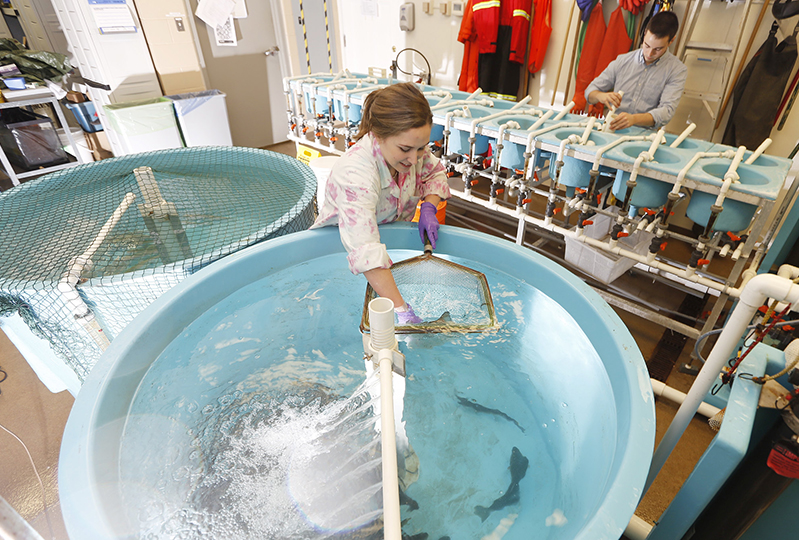About the Research Support Fund
Sustaining both discovery-based and applied research at Mount Allison requires financial investment in both obvious project-related expenses (i.e. the direct costs of research), as well as the scaffold of services that support the research enterprise.
These indirect costs of research are borne by the University, thereby permitting faculty and student researchers to focus on implementing the research plans proposed in funding applications. Indirect costs include include:
- maintaining modern research labs and equipment
- providing researchers with access to up-to-date knowledge resources
- managing and administering research grants
- meeting regulatory and ethical requirements
The Research Support Fund is an investment by Canadian taxpayers to support some of the indirect costs of research associated with managing the research funded by the three federal granting agencies:
- Social Sciences and Humanities Research Council (SSHRC)
- Natural Sciences and Engineering Research Council (NSERC)
- Canadian Institutes of Health Research (CIHR)
The Fund helps institutions support the on-going day-to-day administrative expenses required to maintain an active and vibrant research environment.
Formerly known as the Indirect Costs Program (established in 2003), the Research Support Fund is disbursed to post-secondary institutions via an annual grant program. The value of the grant received is based on the value of Tri-agency research funds awarded to Mount Allison researchers and administered by the University.
Institutions have flexibility in deciding how to use their grant, provided that the funds support the payment of current expenditures attributed to federally-sponsored research that falls within the following five categories:
- Research facilities
- Research resources
- Management and administration of an institution's research enterprise
- Regulatory requirements and accreditation
- Intellectual property
For more information, see http://www.rsf-fsr.gc.ca/
Putting the RSF to use and communicating our plan
Mount Allison intends to invest the Research Support Fund across all five eligible expense categories. Learn more about the planned allocation of our 2025-26 grant and our performance objectives for the coming year.
Details on Mount Allison’s previous RSF grants and how they have been allocated, as well as performance objectives and outcomes for previous fiscal years can be found on the Reports and accountability page.
Mount Allison is committed to effectively communicating the value and use of the RSF to our researchers and the broader community. Read our RSF Communication Plan.
Supporting research excellence: Understanding the impact of the RSF
The RSF provides critical support for sustaining and advancing Mount Allison's research mission. Here are two examples of our grant in action.
How Mount Allison University’s Animal Care Program Benefits from the Research Support Fund
The Research Support Fund (RSF) helps Canadian universities maintain the infrastructure and supports needed to conduct world-class research. At Mount Allison University, the RSF is a behind-the-scenes powerhouse—facilitating compliance, ethics, and operational excellence across our research programs.
In 2024–25, Mount Allison allocated over $50,000 from the RSF to uphold essential regulatory standards, including the work of the Research Ethics Board, Biosafety Committee, and the Animal Care and Use Program.
Animal Facilities: A Foundation for Discovery
Mount Allison’s Animal Care and Use Program maintains three animal holding facilities—two aquatic labs and one small mammal facility— that are essential to many tri-agency funded research programs in natural and health sciences. These facilities enable research programs spanning ecology, behaviour, physiology and neuroscience, and having broad applications from aquaculture to human health and disease prevention. These facilities and their operations are certified by the Canadian Council on Animal Care (CCAC), which sets national standards for ethical animal use in science.

Contributions from the RSF ensure that Mount Allison meets these standards—supporting our Animal Care Committee, including our skilled Animal Care Technicians, who review, approve, and monitor research involving animals.
The Experts Behind the Care
Mount Allison’s animal facilities are managed by two dedicated technicians whose work is vital to both ensuring animal welfare and research success.
A trained aquaculturist, Shelley Leblanc oversees fish health, water systems, and infrastructure in both the Harold Crabtree Aqualab as well as the Gairdner Building facility. She trains students in fish husbandry and welfare and collaborates with researchers on projects ranging from fish behaviour to hatchery innovation, ensuring welfare of species such as Atlantic salmon, brook trout, shortnose sturgeon, tilapia, zebrafish and goldfish.
Jackie Jacob-Vogels manages the wellbeing of rodents used in both pedagogical and research activities. Responsible for coordinating use of the small mammal facility, she liaises closely with Facilities Management personnel to ensure equipment and environmental conditions are well maintained. Jackie develops facility protocols for rats and mice, prioritizing their social development as well as their physical health, and trains student researchers to ensure those ethics are centred in all the research work that takes place.
RSF Impact: Enabling Ethical, Innovative Research
Thanks to RSF support, Mount Allison researchers can pursue bold questions while maintaining the highest standards of care. Whether exploring how trout adapt to changing environments or how the brain regulates hunger, these discoveries are made possible by a strong foundation of ethical infrastructure. The RSF may be behind the scenes, but its impact is front and centre—empowering Mount Allison’s vibrant research culture and helping shape a healthier, more informed future.
At Mount Allison, promotion of open scholarship benefits from the Research Support Fund
The Research Support Fund (RSF) plays a vital role helping Canadian universities sustain the tools, spaces, and expertise needed to make impactful research possible. In 2024–25, over $290,000 from Mount Allison’s RSF grant was allocated to enhancing research resources— including the information services and supports offered through Mount Allison’s R.P. Bell Library. This investment is critical to sustaining and promoting research activities across all disciplines at MtA, especially those funded by Canada’s Tri-agency granting councils.
Empowering Researchers Through Data and Digital Services

One of the key figures driving this support is Elizabeth Stregger, Mount Allison’s Data and Digital Services Librarian.
Elizabeth plays a pivotal role in helping researchers manage, share, and preserve their data and research outputs. Her work directly supports Mount Allison’s commitment to Open Science and Scholarship, ensuring that research is accessible, rigorous, and transparent.
Supported by RSF funding, Elizabeth leads three major initiatives that help researchers meet Tri-agency requirements for data stewardship and open access publishing:
-
Research Data Management (RDM) programming
-
Data deposit in Borealis – the Canadian Dataverse Repository
-
Development of Mount Allison’s digital repository, Scholaris
Making Research FAIR and Reducing Barriers to Open Scholarship
Guided by Mount Allison’s institutional strategy for research data management, Elizabeth provides training, curates datasets, and improves metadata and documentation to make data more FAIR—Findable, Accessible, Interoperable, and Reusable. Her support is especially valued by researchers in the Faculty of Science, who increasingly deposit data in Borealis with her guidance.
Elizabeth then supports researchers share their published work, including student theses, openly on Scholaris. The development and maintenance of this institutional repository mitigates barriers to mobilizing research outputs and helps scholars meet Tri-Agency Open Access requirements.
Borealis and Scholaris are national network services. Championed by Elizabeth, Mount Allison’s partnership with these initiatives ensures researchers are supported at the highest standard in digital and data science. Similarly, Elizabeth liaises with external partners, like ACENET, to help faculty in the digital humanities connect with national infrastructure to support open scholarship. The library also collaborates with internal offices to promote transformative publishing agreements that simplify access to scholarly content and allow Mount Allison researchers to publish open access with reduced or no individual fees—further removing barriers to knowledge sharing.
A Future-Focused Research Environment
Thanks to the RSF, Mount Allison continues to build a robust, inclusive, and forward-looking research environment. The fund enables essential services that empower researchers to meet evolving standards in data management and open access, ensuring that Mount Allison researchers remain at the forefront of discovery in Canada.
Mount Allison University gratefully acknowledges the contribution of the federal government and Canadian taxpayers to our research enterprise through various grant programs and through the Research Support Fund.

